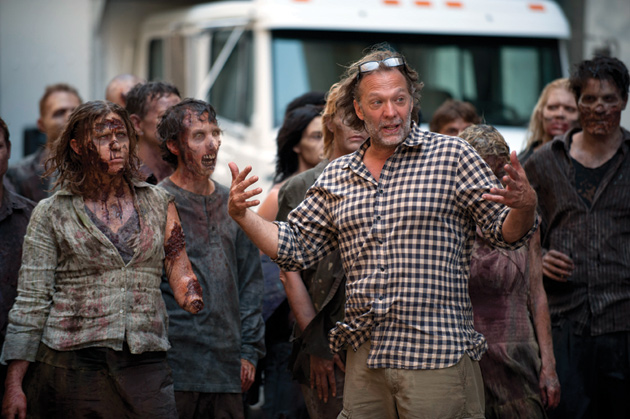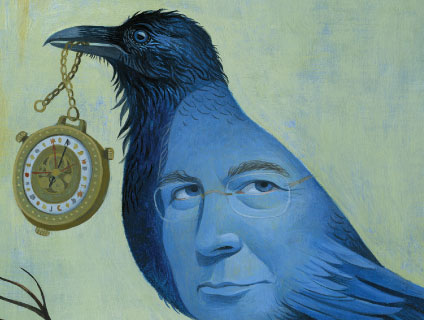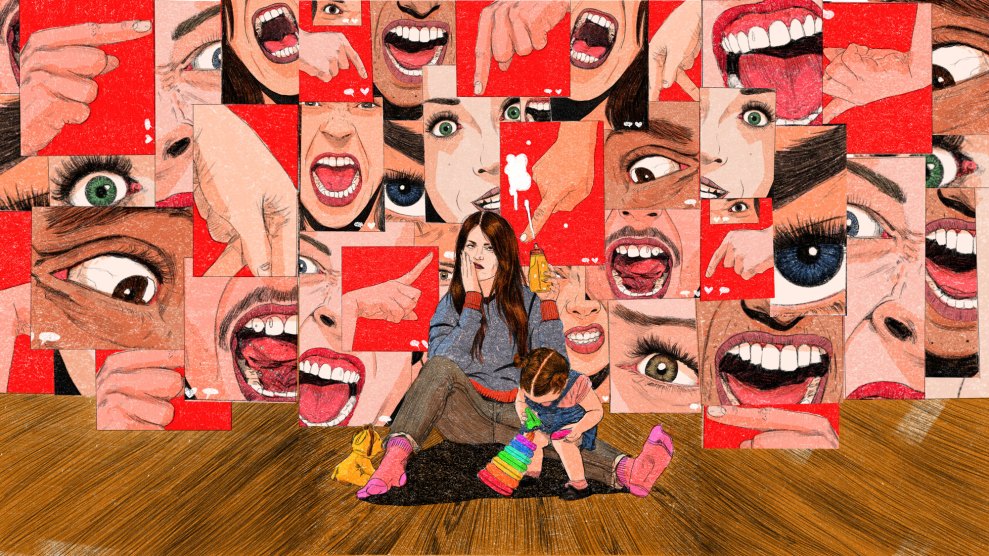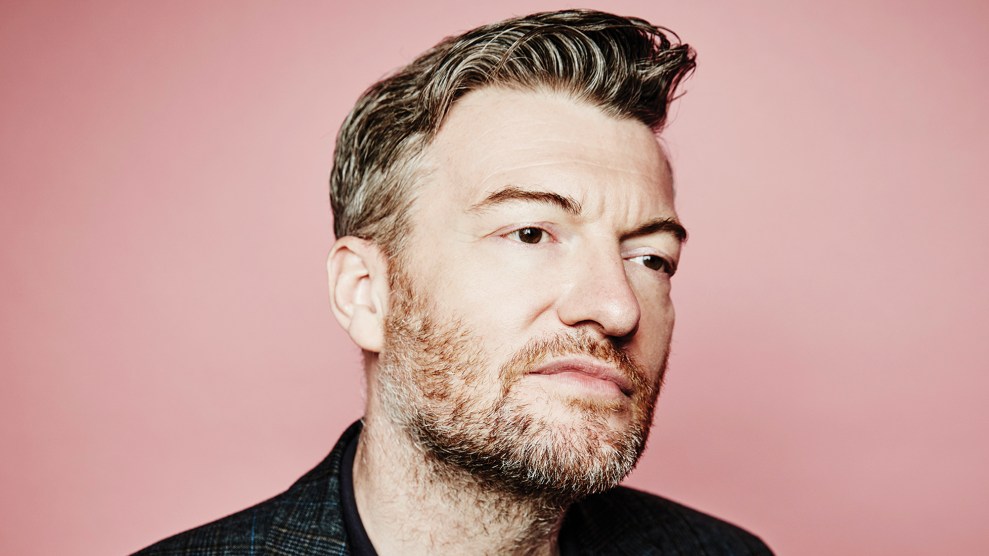
Maarten de Boer/ Getty Images
Charlie Brooker is 45 minutes late for our phone interview, and I’m starting to feel like a desperate adolescent. Then again, fans of Black Mirror, Brooker’s smart, Twilight Zone-esque TV series, have waited years for the six new episodes releasing on Netflix on October 21 (with six more to come).
For US viewers, the closest comparison to the 45-year-old Brooker might be our two Jo(h)ns—Stewart and Oliver. Over the years, on Britain’s Channel 4 and in a Guardian newspaper column, Brooker has wittily skewered politicos, celebrities, media personalities, and culture in general—his satirical shows (Newswipe, Screenwipe, Charlie Brooker’s Weekly Wipe, etc.) pair current events with snarky sofa commentary.
But Black Mirror led Brooker down a darker path. Each superbly acted episode takes some aspect of our tech-obsessed culture—voyeurism, social-media rankings, our desire for longevity—to absurd and often harrowing extremes. In the show’s 2011 debut, a princess is kidnapped. Her captor pledges to release her unharmed on one condition: The prime minister must have sexual relations with a pig on live television.
Imagine Brooker’s surprise last year, when a scabrous rumor emerged about an act Prime Minister David Cameron had supposedly performed on a hog’s head in his youth. “Am I living in a simulation?” Brooker recalls thinking.
Mother Jones: So we’re a bit cross with you for making us wait so long for new episodes. Explain yourself, sir!
Charlie Brooker: Well, I was doing some other things.
MJ: I would think a string of one-off episodes is way harder to pull off than a regular TV series.
CB: Massively so. You don’t have the economy of scale of building a set once and casting once. You blow up the world, basically, at the end of each episode. On the other hand, there’s a real freedom, because you’re kind of reinventing the show every week.
MJ: A friend said to me recently, “America needs a Charlie Brooker.” What is that, exactly?
CB: I don’t know. I’m a worrier. In the UK, if I’m known for anything, it’s sort of for being cynical. I’m quite geeky and I’m very much into video games and technology and stuff like that. I think overseas viewers assume that Black Mirror is written by the Unabomber, essentially—a Luddite, technology-hating, angry old man waving his fist at the App Store. But I’m more pro-technology than people probably realize.
MJ: So where does Black Mirror fit into the Brooker continuum?
CB: My continuum? Blimey! For me, it’s all part of the whole. Often the ideas in the show start out as ideas that make you laugh—outrageous “what if” ideas. I wanted an outlet for doing those.
MJ: Were you a fan of The Twilight Zone?
CB: I was. I was more aware initially of shows like Tales of the Unexpected. And the BBC used to put on a lot of one-off, bizarre television plays. I saw The Twilight Zone for the first time when I was 12 or 13. I used to stay up late to watch. And [British television series] Hammer House of Horror. I used to really enjoy these one-off stories where often there would be an incredibly cruel twist. A good example is the episode with Burgess Meredith and there’s a nuclear war and he drops his glasses. To this day, you can show that to anyone and they’ll go “Bwrrrrrrrr!” You know, sort of wander away shuddering.
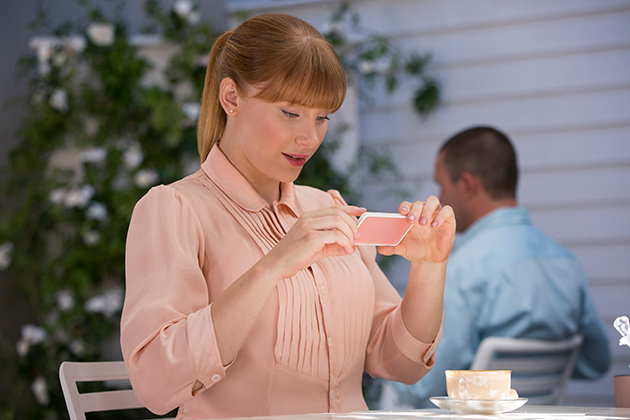
MJ: I’m curious how your upbringing presaged your outlook. I gather you were raised by Quakers?
CB: Technically. I wasn’t really aware they were a religious organization for quite some time. But my grandparents were very devout and ran a Quaker meetinghouse and were missionaries at one point. I would say the thing you can still see in Black Mirror is that I was probably traumatized by the specter of nuclear war. I was born in 1971, and in the ’80s I came to understand that I was inevitably going to be frazzled to death in the nuclear apocalypse. And yet you’d go out in the street, and everyone was acting like everything was fine. There was a program the BBC put on called Threads.
MJ: I’ve seen it! It’s horribly depressing.
CB: It’s a barrel of laughs, isn’t it? It makes The Day After look like friggin’…insert name of cheerful thing here. It was one of the things that made me really worry about worst-case scenarios. There’s something impish and probably somewhat therapeutic about thinking about those things. In comedy writing, a sitcom plot is basically the same thing: What’s the worst thing that could happen? But you’re playing it for comic effect. It’s a similar muscle being used with Black Mirror.
MJ: Do ideas for the show just occur to you, or is there a methodical process in which you consider different aspects of the culture?
CB: Like Trump! What’s the Black Mirror version? Weirdly, no. When we try that, it doesn’t really work out. The easiest ones to write—the best ones, in a way—suddenly appear. “Be Right Back,” in which Hayley Atwell brings Domhnall Gleeson back from the dead using his social-media profile, sprang out of an unrelated conversation. Other stories you thrash away at for weeks and weeks.
MJ: The new episode “Men Against Fire” is based on the premise that only a small minority of soldiers fire their weapons in battle, and how the military might address that.
CB: My wife made me watch this documentary about the Iraq War, and there was a really powerful moment where they followed some civilian whose family had been killed. This was 5 or 10 minutes of this woman talking, and it was extremely arresting. You realize how you never hear from the person on the receiving end of a war without a reporter stepping in to compartmentalize the story. Usually they’re just a few shots at the end of a news report, wailing and screaming at a funeral. While I was thinking about that, the military, I read a book called On Killing, about the obstacles people have to pulling the trigger in combat. So sometimes you just absorb all this stuff without realizing you were doing research.
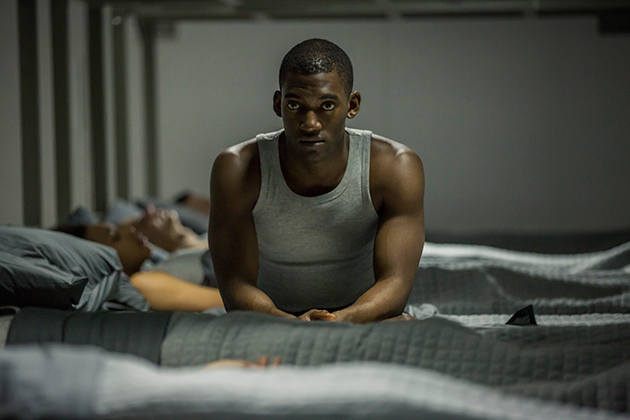
MJ: Which of the episodes to date hews closest to real life?
CB: “The National Anthem” seems to have happened!
MJ: We’ll get to that. What else?
CB: “Waldo” was one episode I always felt I didn’t quite crack. And weirdly, now that feels like one of the more prescient ones.
MJ: You see parallels there with the rise of Donald Trump?
CB: Yeah, and a sort of angry populism here in the UK and across Europe, a sort of anti-political mood and what then steps into that place? In one episode you won’t have seen, there’s a very simple gaming gadget that turns out to be a monstrous idea, which I suspect we will end up doing for real.
MJ: Are you worried you’ll give somebody the idea?
CB: Kind of. I sort of think [this idea] is inevitable. But we’ve done things before where something similar happens afterward. I think somebody’s marketing a thing that Hoovers up your Twitter and it will continue tweeting for you after you’re dead. I have no idea whether they saw “Be Right Back” or not.
MJ: You have two young children. Has being a father changed your view of technology?
CB: Yes. In fact, we’re now working on a script about parenting. Our four-year-old, like a lot of kids, you introduce him to an iPad and he quite quickly gets drawn in in a way that you’re like, “Wow, I’ve got to stage an intervention here.” He picked up on gaming terminology really quickly. If you say, “Keep practicing holding a pencil and see if you can draw a letter, the alphabet,” he understands that if you do that you’ve unlocked Level Two. [Laughs.] Literally! And you think, “Is that good?” I suppose kids probably know less boredom these days—or at least a different kind of boredom.
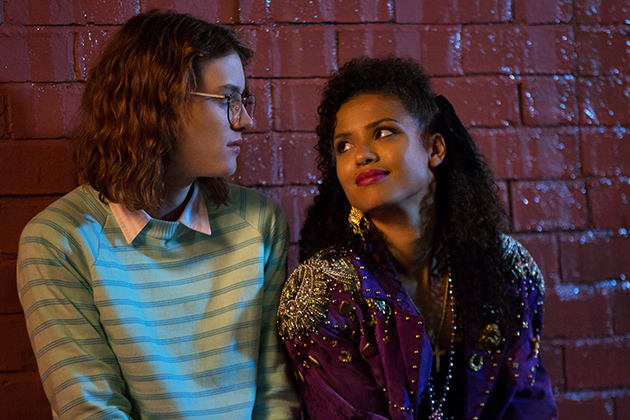
MJ: “There’s nothing good on the internet!”
CB: [Laughs.] “I’ve read all of that! I’m waiting for Internet 2!” My kids are very young. I’m sure there’s a world of horror for me to worry about as they get older. I did once leave one of them watching something on YouTube, something completely innocuous, and I went out of the room and the algorithm kept playing the next thing and the next thing and somehow worked its way around to showing him the trailer for John Carpenter’s The Thing—at which point I walked back in. He wasn’t happy.
MJ: I’m less concerned with what my kids see than with what the technology takes them away from. It seems like kids of our generation had to use their wits to stave off boredom.
CB: I grew up in the countryside and I know what you mean. But there’s a danger of us romanticizing that. Because when I was a kid in 1982, that’s what my parents were saying to me about television and comics and computer games!
MJ: Aaaah! We’ve become them!
CB: Yeah, I know. They would go, “It’s a nice hot day. Why are you inside watching the TV?” And you go, “Well, ‘cause it’s better?”
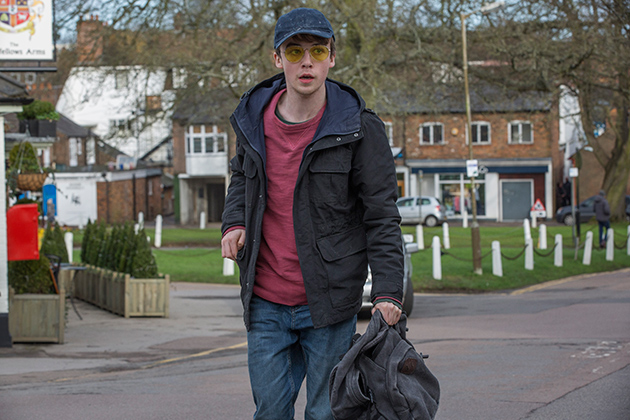
MJ: One of your kids is named Huxley. Any story there?
CB: No. He’s not named after Aldous Huxley. I haven’t even read Brave New World!
MJ: I’m surprised.
CB: I’m terrible at reading fiction. I don’t have the attention span—it’s awful. Most of the books I read these days are children’s books at bedtime.
MJ: Do you attribute this lack of attention to the pace of media and technology?
CB: Oh, totally! Well, with caveats. I’ve always had a bad attention span. But I downloaded an app the other day that monitors your phone and shows you every single time you picked it up and how long you looked at it for, and it scared the shit out of me!
MJ: Okay, so what was your first thought when you heard the rumor that David Cameron maybe once did this unspeakable thing with a pig’s head?
CB: That it was freakish and weird. It seemed such a coincidence that I couldn’t quite process it. And then, as it sank in, I genuinely had the thought, “Am I living in a Truman Show sort of VR simulation designed to send me insane?”
MJ: Where did the “National Anthem” episode come from?
CB: It was just a funny idea I’d been knocking about. I initially thought about a beloved celebrity having to do that—and then I watched an episode of 24. In my head, I was writing almost a parody of a 24-style president woken in the middle of the night with a crisis. It seemed more interesting to play it ultrastraight and to have the viewer’s initial reaction be one of laughter and disbelief—and just have the whole thing become progressively more uncomfortable.
MJ: Why a pig?
CB: I actually had that conversation with [Channel 4 Chief Creative Officer] Jay Hunt. We were at a bit of a crisis point. I’d written a totally different script—about war, basically—that got rejected at the last minute for various reasons. The whole of the series was in doubt. I said, “Well, there is one other idea.” [Laughs.] I pitched her the opening scene (prime minister, middle of the night, he’s woken up…). She paused, and then she laughed. She was very intrigued and all that, and then she said, “Does it have to be a pig?” So we went through various options: Could it be a supermarket frozen chicken? A giant wheel of cheese? A pig seemed just the right level of absurd, but then when he walks in and there’s actually a pig there, it’s awful.
MJ: So, will Black Mirror go on indefinitely?
CB: Hope so. As long as we’ve still got crazy “what if” ideas, we can continue. It’s outpacing reality that’s probably the challenge.

